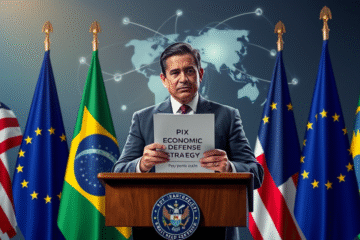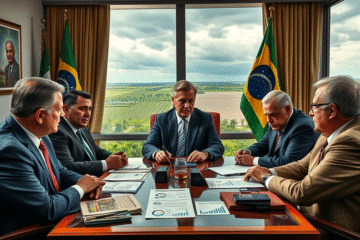Political Crises Affect the Brazilian Economy
Political Crises in Brazil have become a recurring theme in current economic discussions.
In this article, we will explore how these crises impact business confidence and the country's institutional stability, resulting in a weakened economy.
The analysis will focus on recent international news that highlights not only domestic challenges but also political distractions that impede progress.
Furthermore, we will discuss the relationship between court decisions, government actions, and the agricultural sector's response to adversity.
The search for solutions and a peace agenda is crucial for Brazil's economic recovery.
Economy in Check due to Personal Political Crises
The Note of July 15, 2025 exposes the deep fissures in the Brazilian economy, heavily impacted by personal political crises.
Constant internal disputes not only undermine business confidence, but also place Brazil in the spotlight in the international press for negative reasons.
This economic fragility, highlighted in the note, is intrinsically linked to the government's inability to establish an agenda that prioritizes political and economic stability.
Congress's erratic decisions amid heated political disagreements divert focus from sustainable economic development, highlighting the political ineffectiveness that plagues the nation.
Government analysis highlights how conflicts between the Executive and Judiciary contribute to this instability.
At the same time, the Judiciary's action, instead of bringing peace, seems to reignite tensions.
To understand the depth of this analysis, explore this critique of the Judiciary, which demonstrates how an active judicial policy contributes to economic and social unrest.
The situation is aggravated by external decisions, such as the tariff hike imposed by Donald Trump, which has repercussions on Brazilian exports, adding fuel to the internal crisis.
to the internal crisis.
Government: Reopening Wounds and Absence of a Peacemaking Agenda
A reopening of wounds policies by the current government reveal a worrying scenario where the absence of a peacemaking agenda.
Instead of promoting dialogue and seeking joint solutions, we see a repetition of old confrontations that do not favor the construction of a united country.
O negative impact of these actions directly impacts the Brazilian economy, which is already facing serious challenges as evidenced in documents such as the Note of July 15, 2025.
Institutional trust is undermined when leadership prefers confrontation to conciliation.
By focusing on frictions, the government neglects the urgency of structural measures to stabilize the economy.
“The insistence on friction prevents any horizon of stability”
, is an undeniable reality that applies to the current political scenario.
A absence of a peacemaking agenda amplifies insecurity and affects not only the domestic market, but also Brazil's perception on the international stage.
As a result, necessary reforms remain stalled and society remains divided in a game of mutual blame, delaying effective solutions.
National Congress: Disputes that Ignore the Economy
O Brazilian National Congress has been starring in a sequence of distracting disputes what ignore economic interests, diverting focus from the issues that really matter for the country's growth.
Crucial decisions for economic stability are often overlooked in favor of internal conflicts that contribute little to Brazilian society.
This is evidenced in a note released in July 15, 2025, which severely criticizes this stance.
The consequences of this negligence are reflected in institutional instability and a decline in investor confidence in the country, creating an insecure economic environment.
The economic sector faces:
- CPIs without fiscal focus.
- Endless debates that do not result in effective policies.
- Decisions paralyzed by political clashes.
By fueling irrelevant confrontations, Congress diverts attention from necessary reforms, thus contributing to economic stagnation.
Brazil, instead of making headlines for its vast opportunities, is known for its internal crises, preventing any sustainable socioeconomic advancement.
This reality highlights the urgency of a political agenda more focused on collective benefits.
Judiciary, Tarifaço and the Trial of Jair Bolsonaro in the Supreme Federal Court
Brazil's economy faces complex challenges amid political instability, where the Judiciary plays a crucial role.
At the center of this turmoil is the Supreme Court's trial of Jair Bolsonaro, which adds to the country's uncertainty.
In addition, the tariff hike imposed by the United States under Donald Trump's administration adds significant pressure to the already tense economic scenario.
This decision was a response to internal events in Brazil and directly impacts Brazilian exports, generating a domino effect across various economic sectors.
A instability generated by the Judiciary is aggravated by unpredictable decisions, reflecting on market confidence, where businesspeople hesitate to invest in a scenario of uncertainty.
In view of this, representatives of the agricultural sector, during meetings, reaffirmed the need to seek solutions to mitigate the negative impacts of the tariff hike, as evidenced in reports published in G1.
The phrase “
Legal certainty does not arise from erratic decisions
” summarizes the need for institutional stability for the resumption of economic growth, as business confidence is fundamental for long-term economic recovery.
International Headlines: Internal Crises in Evidence
International media highlights the internal crises that Brazil faces, reducing its appeal to investors and gaining unwanted attention.
The note of July 15, 2025 criticizes Brazil's economy for being subject to “personal political crises,” which is constantly highlighted in the international press.
With news that resonates with the political instability and its economic consequences, renowned newspapers such as
- The Guardian
- Financial Times
, report the lack of predictability that affects the business environment.
Furthermore, the recent tariff hike imposed by Donald Trump further aggravates the negative perception of Brazil abroad, creating a blemish on the country's image.
This weakens investor confidence and obscures opportunities, causing Brazil to appear in the headlines not for its opportunities, but for its internal crises and political controversies.
Meeting with the Agricultural Sector: Tariffs and Pathways to Export
At the meeting on July 15, 2025, representatives of the government and the agricultural sector discussed alternatives to address the tariffs imposed by the United States.
It was left decided that there will be no extension of tariffs, but the government will adopt measures to mitigate the effects on Brazilian exports.
Members of impacted sectors, such as fruit, meat, coffee, and juice, participated in the meeting and sought government support for immediate solutions.
A urgency in the negotiations became evident during the meeting, where the sectors registered concerns about its future economic viability.
The government, represented by several departments, reiterated its commitment to stabilizing the situation.
O focus fell on solutions for exports, who migrate to more robust trading techniques with alternative markets.
Among the actions discussed, the creation of a quarterly progress review schedule was emphasized.
Below is a table that summarizes the points discussed:
Point Action Impact of tariffs Evaluate tradeoffs Logistics Seek bilateral agreements Calendar Quarterly review
Therefore, a coordinated response is expected to protect the Brazilian agricultural economy until market conditions return to normal.
Business Confidence and Institutional Stability
Business confidence and institutional stability are the foundations of a healthy economy.
Therefore, any deviation from this scenario could lead the country into a spiral of uncertainty and losses.
Currently, Brazil's economy faces challenges exacerbated by internal political crises that undermine national and international confidence.
With the recent tariff increase imposed by the US government, Brazilian society must unite to seek viable, long-term solutions for when the situation is more stable.
As pointed out by Getulio Vargas Foundation, the decline in business confidence needs to be urgently reversed, and this will only happen when regulatory predictability is restored.
The political class has a moral duty to work together for Brazil's stability, strengthening institutions and restoring investor confidence.
Only with a peaceful and coherent agenda will it be possible to restore economic growth and ensure a prosperous future.
Therefore, I urge everyone to prioritize the country's economic well-being over any personal or partisan disputes.
The time is for unity and action.
The importance of business trust and institutional stability cannot be underestimated.
For Brazil to overcome its political crises and return to a path of growth, it is essential that the government and the judiciary align in search of effective and peaceful solutions.



0 Comments